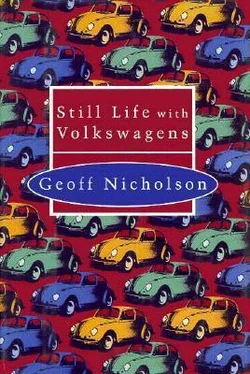“Well, it’s going to be a wet one!” she blurts cheerily. “Over here in South — East England there’ll be scattered showers, heavy in places. Moving north there’ll be intermittent drizzle in all parts. In Wales there’ll be a wet start and it’ll be wetter later. In the North — West it’ll be bucketing down, and in Scotland it’ll be a real cats and dogs number. Everywhere there’ll be cloudbursts, downpours and deluges. Let’s face it, whatever you’re doing tomorrow, you’re going to get peed on good and proper. Oops did I really say that?”
So far she has been rushing through her words but now she stops, puts on a serious expression and eyeballs the camera.
“Look,” she says, “I’ve got to end this programme on a personal note, right? Some of you probably know that my Dad’s been locked up in a loony bin these past few years. I mean, you ought to, it’s been in all the bloody tabloids. Anyway, he’s out now, and me and my Mum don’t know where he is. And we’re a bit choked, right? So I just want to say, if you’re out there Dad, watching this, there’s one or two things I want you to know. Basically, I still love ya Dad. I know we’ve had our ups and downs, but it’d be really ace to see you again Dad. Don’t become a stranger. Come home Dad. And if you can’t come home, at least stay out of the rain.”
In the end it is rather a good piece of television. She uses the camera well and towards the end her voice catches in her throat very effectively. Afterwards the floor manager says, to nobody in particular, “If her Dad’s really out there watching weather forecasts like this, at half past two in the morning, he must be even more bonkers than when he was banged up.”
♦
It is raining. To Charles Lederer who is standing with his thumb out at a traffic roundabout somewhere in the West Midlands it feels as though it has been raining forever. His Panama hat has turned to pulp on his head. His blazer and flannels have been made limp and ragged by the rain. His carpet slippers have absorbed so much water they feel like heavy sponges weighing down his legs.
The world looks grey and industrial. He has been in motion from the moment he left the Milton Maynard Mercy Seat. He has a wife out there somewhere, and a daughter too, but he thinks neither would welcome him. He has been hitchhiking, briefly entering other people’s strange, private, mobile worlds. He has been seeing England through glass, through tinted windscreens and streaked side windows. It is not quite the England he used to know. Perhaps something critical has changed during his incarceration. The landscape he sees now looks inhuman, a savage place of ring roads and by-passes and orbital routes, of traffic snarl-ups and crawler lanes solid with eighteen wheeler trucks. Where once he had seen (or had he just imagined?) rolling hills and village greens, there were now parks; industrial parks, retail parks, car parks, theme parks. The ground itself seems to be in some constant state of tumult and mutation. Processes of demolition and rebuilding, of growth and decay, of creation and dereliction, all seem to be occurring at the same time, all cancelling each other out. He could not tell you where he has been and certainly he cannot say where he’s going, a fact that is the cause of some irritation to the people who offer him lifts. He sees the best and worst of people while hitchhiking. Some drivers see an old man in need and are overwhelmingly generous. Others see an old tramp whom they fear will mess up their upholstery. Some drivers buy him coffee and sandwiches, slip a couple of pounds into his hand as they drop him off. Others just shout abuse out of the window as they drive past him; mostly young men with honking voices who call him a wanker because he hasn’t got his own car. Or they slow down as though to give him a lift then, as he hurries hopefully towards the car, drive off at speed. Or they swerve their cars towards him as though trying to run him down. It is a depressing state of affairs.
The rain continues to soak into him. It is starting to get dark, and the traffic is looking ominously thin. There is nothing in sight, no houses, no barns, no petrol stations where he might shelter. A vast truck hauling a container load of petrol, so lumbering yet so fast moving, negotiates the roundabout and fetches up a tidal wave that breaks across Charles Lederer’s chest. Inexplicably, he smiles a little. Perhaps he has the very slightest consolation in knowing he cannot possibly get any wetter.
It occurs to him that he might have to spend the night here. It is rural enough but there’s no hope of comfort or shelter, nowhere you could imagine sleeping. Not that he’s been getting or needing much sleep lately. He has learned that people don’t like you to accept a lift from them and then immediately nod off. The staff of service station restaurants certainly don’t like you falling asleep at their tables. What little sleep he’s had has arrived unbidden, and he has dozed off at the roadside or in a hedge. But sleep has always been fitful, disturbed by the hard ground and the roar of passing traffic.
He thinks he might be about to nod off again now when a pair of low, blurred headlights appear through the rain. Charles Lederer sticks out his thumb, more out of habit than in hope, and the car miraculously stops. It is a Volkswagen Beetle, old and careworn, a bit rusty here and there, belonging to Spider, the boy whose soul Fat Les threatened to take in part exchange. He has not followed through with the plan to have his car completely tarted up by Les. Instead he got him to fit a cheap set of moon disc hubcaps. Very smart they look too, and the best part of it is he can still go around saying his Beetle was worked on by Fat Les. He throws open the passenger door for Charles Lederer.
“Get in, mate,” he shouts. “Quick.”
Charles Lederer hesitates. He moves towards the car’s open door then stops.
“No, I’d probably better not,” he mutters to himself.
“What?” shouts Spider.
“You’re probably not going my way,” Charles Lederer says speaking louder and more clearly.
“In this rain, what does it matter?”
Charles Lederer hovers on the threshold, obviously torn, wanting to get in, and yet it’s as though he’s suffering from some terrible anxiety, some phobia.
“What the hell’s the problem?” Spider shouts.
“Well, this is a Volkswagen, right?”
“Right.”
“I’ve had some bad experiences with Volkswagens.”
“So have I!” says Spider. “Now get in before you catch your death.”
Charles Lederer grits his teeth and forces himself to get in the car. Spider says ‘Well done’ and the car pulls away into the cold grey curtains of rain.
Charles Lederer has been troubled by the problem of what to say to the drivers who give him lifts. A lot of them just want to talk at you and that’s fine by him. Others want to discuss issues, to talk about money or work or cars or politics, all things that once exercised Charles Lederer quite passionately, but today they arouse nothing in him at all. Consequently he finds he is not much of a conversationalist in these matters. But the most objectionable drivers are the ones who insist on questioning him about his life and times. He doesn’t want to tell them all his secrets and yet he doesn’t want to lie. So he just tells them he’s been in a mental home for a few years, and that generally shuts them up very efficiently.
He has none of these problems with Spider. The stereo system in the Volkswagen is too loud to permit conversation, but he doesn’t complain. He is quite happy with his lot. The interior of the car is dry, and warm enough for steam to start to rise from his wet clothes. They drive for an hour or so before Spider abruptly turns off the music and says, “Fancy a burger, old timer?” Charles Lederer thinks it’s best to say yes.
Читать дальше












